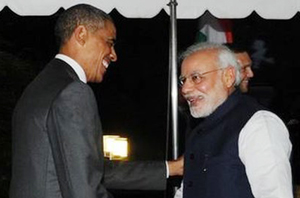Washington, Sep 30: Calling for a new agenda in a novel joint editorial, Prime Minister Narendra Modi and US President Barack Obama today pledged themselves as global partners to enhancing homeland security by sharing intelligence through counter-terrorism and law enforcement cooperation.
Writing in the Washington Post, the two leaders also said India and the US will work jointly to maintain freedom of navigation to lawful commerce across the seas, in significant comments against the backdrop China flexing its muscle over disputes with its neighbours in East and South China seas.
"As global partners, we are committed to enhancing our homeland security by sharing intelligence, through counter-terrorism and law-enforcement cooperation, while we jointly work to maintain freedom of navigation and lawful commerce across the seas," they said.
Referring to the relationship, Modi and Obama said though the it was robust, reliable, enduring and expanding, the true potential of the ties was yet to be fully realised and the advent of a new government in India was a natural opportunity to broaden and deepen the engagement.
"Still, the true potential of our relationship has yet to be fully realised. The advent of a new government in India is a natural opportunity to broaden and deepen our relationship.
"With a reinvigorated level of ambition and greater confidence, we can go beyond modest and conventional goals. It is time to set a new agenda, one that realizes concrete benefits for our citizens," Modi and Obama said, hours before their summit meeting at the White House.
They said the it will be an agenda which will enable both the countries to find mutually rewarding ways to expand collaboration in trade, investment and technology that harmonise with India's ambitious development agenda, while sustaining the US as the global engine of growth.
Modi and Obama said "Today our relationship involves more bilateral collaboration than ever before - not just at the federal level but also at the state and local levels, between our two militaries, private sectors and civil society.
"Indeed, so much has happened that, in 2000, then-Prime Minister Atal Bihari Vajpayee could declare that we are natural allies."
Modi and Obama said they will aim for the strategic partnership to be "larger" than merely the sum of its parts to ensure a better future for the citizens of the two countries as well as to the world at large.
"While India benefits from the growth generated by U S investment and technical partnerships, the United States benefits from a stronger, more prosperous India. In turn, the region and the world benefit from the greater stability and security that our friendship creates.
They lauded the role being played by the "vibrant" Indian American community saying it has been a living bridge between the two nations.
Both the leaders said they will discuss ways to enhance cooperation in trade, science and technology and government-to-government level to help improve the quality, reliability and availability of basic services in India.
"In this, the United States stands ready to assist. An immediate area of concrete support is the "Clean India" campaign, where we will leverage private and civil society innovation, expertise and technology to improve sanitation and hygiene throughout India," they said.
Referring to areas of deeper cooperation, Modi and Obama said collaboration in health sector will help tackling the "toughest of challenges" like combating the spread of Ebola, researching cancer cures or conquering diseases such as tuberculosis, malaria and dengue.
Talking about the existing cooperation, they said "our militaries conduct joint exercises in air, on land and at sea, and our space programmes engage in unprecedented areas of cooperation, leading us from Earth to Mars."
"The exploration of space will continue to fire our imaginations and challenge us to raise our ambitions. That we both have satellites orbiting Mars tells its own story. The promise of a better tomorrow is not solely for Indians and Americans: It also beckons us to move forward together for a better world.
"This is the central premise of our defining partnership for the 21st century. Forward together we go - chalein saath saath," the two leaders said.
They said natural and unique partnership between India and the US can help shape international security and peace.
"Ties between the United States and India are rooted in the shared desire of our citizens for justice and equality. When Swami Vivekananda presented Hinduism as a world religion, he did so at the 1893 World's Parliament of Religions in Chicago.
"When Martin Luther King Jr. sought to end discrimination and prejudice against African Americans, he was inspired by Mahatma Gandhi's nonviolent teachings. Gandhiji himself drew upon the writings of Henry David Thoreau," they said.





Comments
Add new comment